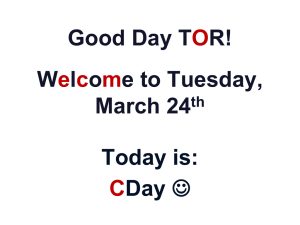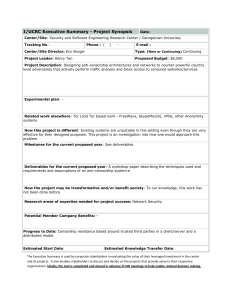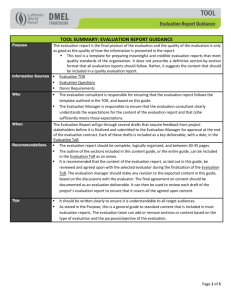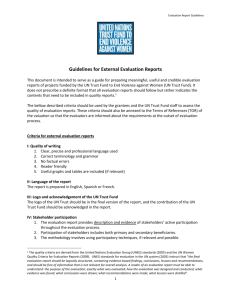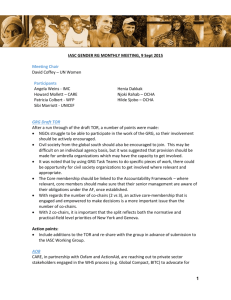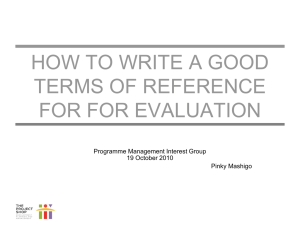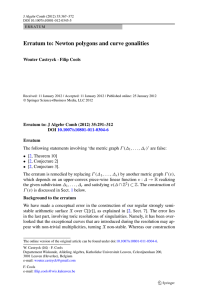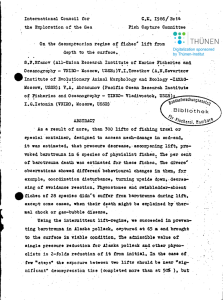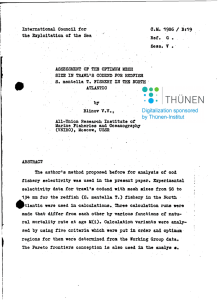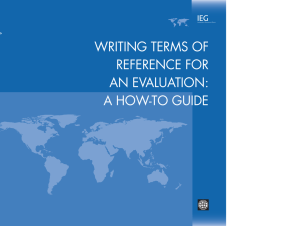PQ FRAMEWORK * concept/proposal/design stage
advertisement
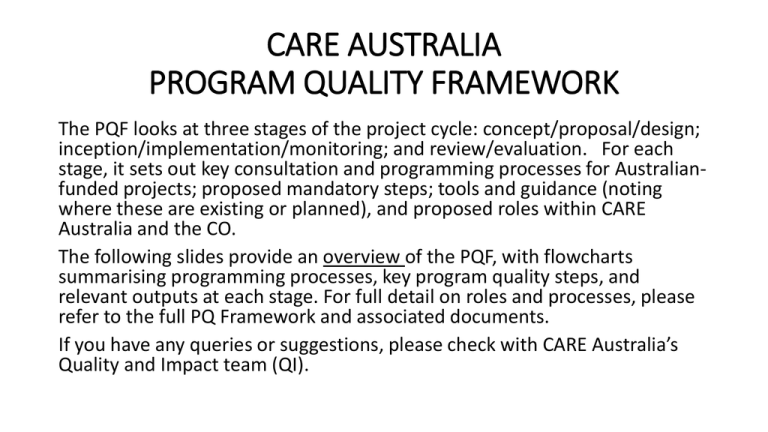
CARE AUSTRALIA PROGRAM QUALITY FRAMEWORK The PQF looks at three stages of the project cycle: concept/proposal/design; inception/implementation/monitoring; and review/evaluation. For each stage, it sets out key consultation and programming processes for Australianfunded projects; proposed mandatory steps; tools and guidance (noting where these are existing or planned), and proposed roles within CARE Australia and the CO. The following slides provide an overview of the PQF, with flowcharts summarising programming processes, key program quality steps, and relevant outputs at each stage. For full detail on roles and processes, please refer to the full PQ Framework and associated documents. If you have any queries or suggestions, please check with CARE Australia’s Quality and Impact team (QI). CA PQ FRAMEWORK – overview of concept/proposal/design stage JOINT PLANNING A joint plan for design process is agreed between CO and CP, to set out key steps, inputs, scheduling. Agreed design plan AGREEING TOR If using consultants, TOR are to be cleared and signed off by CO in consultation with CP before proceeding to recruit. Agreed TOR DESIGN FORMAT APPRAISAL AND PEER REVIEW FINAL SIGNOFF DESIGN REVIEW If not using specific donor format, the design will be based on an agreed CA format. CA arranges appraisal of draft design and peer review with CO; feedback is then consolidated and followup agreed with CO. Following finalisation of design by CO/CA, PCIM reviews and signs off budget; PE IP approves final design to submit to donor. Brief design review concall identifies any outstanding quality or process issues and any followup needed by CA/CO. Appraisal comment Approved final design Design review writeup Agreed design format CA PQ FRAMEWORK – overview of inception/implementation stage STAFF RECRUITMENT INCEPTION PROCESSES SETTING BASELINE ANNUAL REVIEW/ REFLECTION PROJECT REPORTS AND PLANS ONGOING MONITORING CO recruits and briefs staff, with CA providing necessary info on Australian requirem’ts. CO conducts inception workshop or process for staff and stakeholders; CA attends or provides inputs. CO develops TOR for baseline for consultation with CA, signoff by ACD-P; CA reviews draft baseline report, CO finalises. Within Annual Planning, CO leads brief Review and Learning process, documented (by CA if in attendance) for annual reporting. Reports and annual plans for donor provided by CO, reviewed / cleared by CA (including financials) , signed off by PE and sent to donor. CO oversees M&E of implement’n, expenditure; CA monitors including through PSMVs which provide basis for agreed followup. Induction complete Inception complete Baseline TOR and report Brief review document Project reports, annl plans PSMV reports CA PQ FRAMEWORK – overview of review/ evaluation stage JOINT PLANNING AGREEING TOR EVALUATION PLANNING / IMPLEMENT’N REVIEW AND FEEDBACK FINAL SIGNOFF & MANAGEMENT RESPONSE DISSEMINAT’N & REPORTING A joint plan for evaluation process is agreed between CO and CA, to set out key steps, inputs, scheduling, roles. If using consultants, TOR are to be developed by CO with review from CA and signed off by ACD-P before proceeding to recruit. CO oversees eval plan, methodol’gy, field research and incountry consultations with support from CA as agreed. Draft report from CO is reviewed by CA and consolidated feedback provided for followup by CO and consultants. Following finalisation of report by CO/ CA, PE IP approves final report to submit to donor. CO prepares brief management response. CA lodges final report on CI Online library and summary on CA website; includes summary in annual reporting on evaluations undertaken. Agreed joint plan Agreed TOR Agreed evaluat’n plan Documented feedback Approved final report Eval report online
